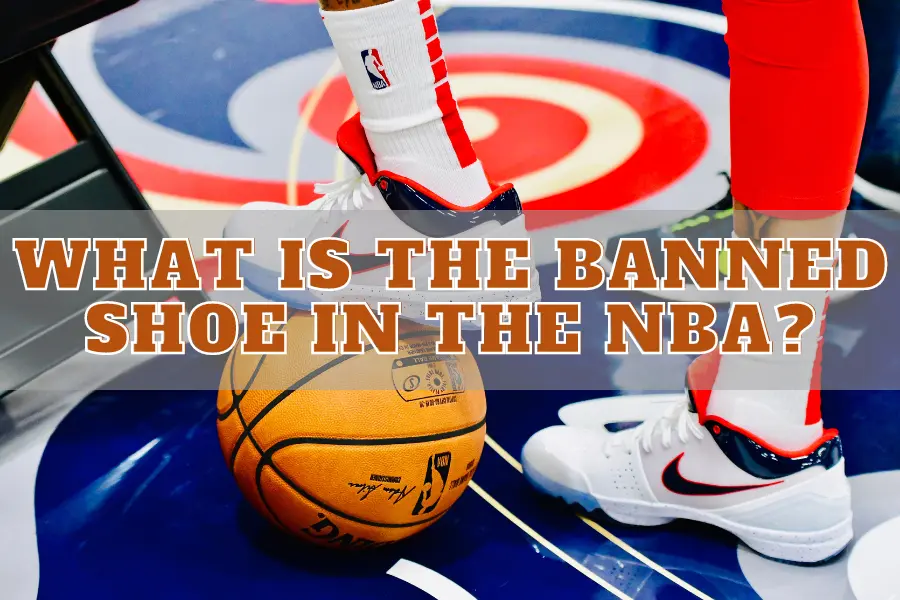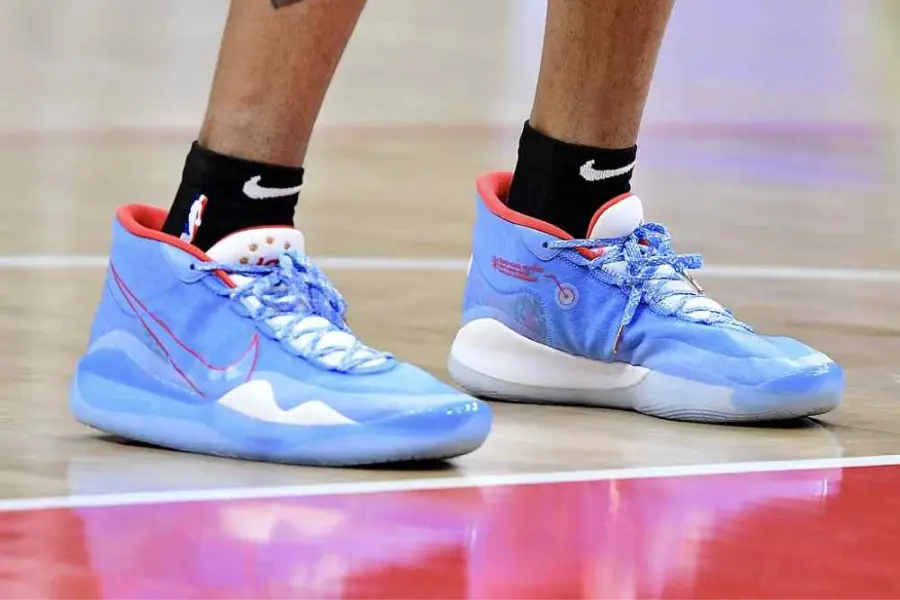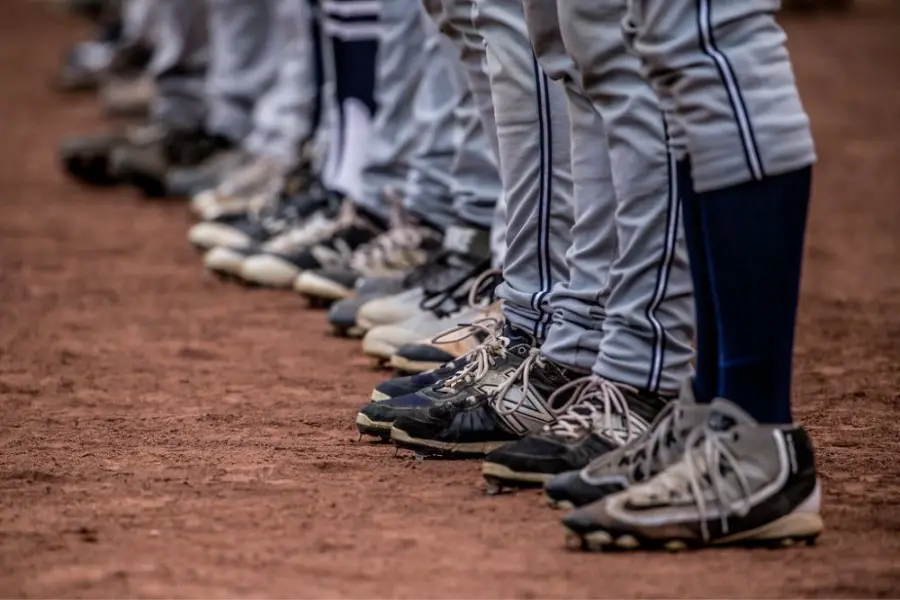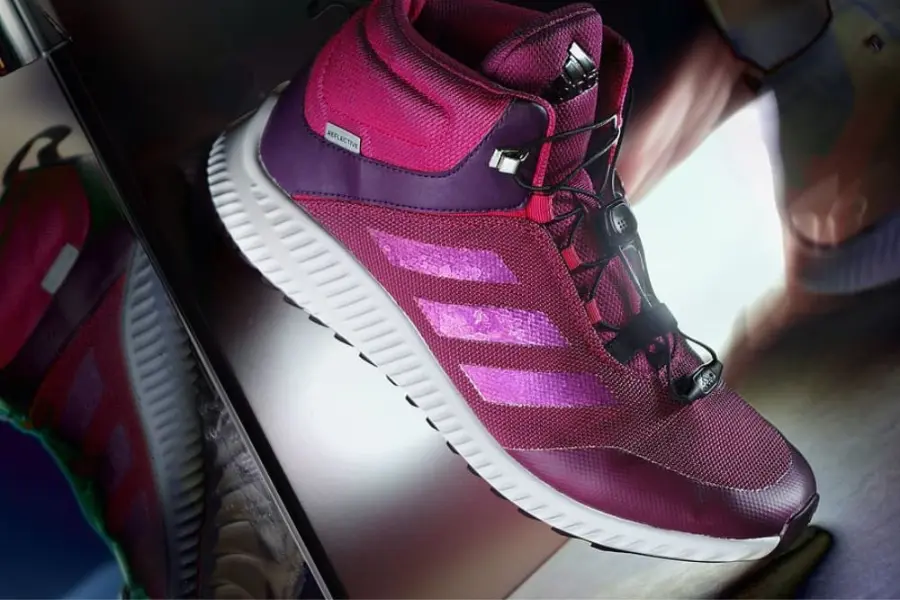What Is The Banned Shoe In The NBA? Why Was It Banned?

Have you ever wondered if there’s a sneaker that’s illegal in professional basketball tournaments? Believe it or not, the National Basketball Association (NBA) has banned a specific sneaker model for offering players an unfair advantage. So, what is the banned shoe in the NBA? Why did it spark such controversy?
The answer is right below. Dive in now!
History Of NBA Shoe Regulations and Restrictions – Updated 2024
The banned footwear in the National Basketball Association refers to a sneaker or footwear model that the league has prohibited for various reasons, such as providing an unfair advantage to players, not meeting safety standards, or violating specific regulations set by the association.
Let’s take a look at the footwear rules throughout NBA history!
(1970s-1980s) – Black & White
There weren’t many sneaker rules in the early days of the NBA. Players could wear pretty much any shoes they wanted because the standard practice at the time was for players to opt for simplistic color schemes, so black and white were the most common choices.
These sneakers reflected the era’s emphasis on functionality over style. Players choose them because they are durable and supportive footwear that can withstand the game’s physical demands.
The Air Jordan Controversy (1984-1985) – Banned
The Air Jordan Controversy from 1984 to 1985 marked a pivotal moment in National Basketball Association sneaker regulations. Michael Jordan’s groundbreaking Air Jordan sneakers, known for their black and red, innovative design & cutting-edge technology, were banned by the league for not adhering to uniform standards.
The league fined Jordan for every game in which he wore these sneakers. This decision sparked widespread debate and scrutiny. It also highlights the intersection of sports, fashion, and commerce within professional basketball.
(Late 2000s-2012) – Full Team Colors
As part of the league’s efforts to promote uniformity and brand representation, NBA players were mandated to wear full team colors on their sneakers. For example, if a player belonged to the Los Angeles Lakers, they would wear sneakers predominantly in purple and gold hues.
During this period, there was a shift towards uniformity, with players’ footwear choices aligning with their respective teams’ color schemes. This move ensured a more cohesive on-court aesthetic, which some sports and fashion fans might have appreciated.
(2012-2017) – Wear Specially Designed Sneakers For Holidays
The NBA’s shoe rules were still pretty strict in the 2010s. Players had to wear mostly black and white sneakers or the team’s colors. However, the National Basketball Association implemented a new rule allowing players to wear specially designed holiday sneakers.
This initiative enabled players to showcase their creativity and individuality through unique footwear designs, further blurring the lines between sport and fashion on the basketball court.
For instance, players often debuted festive-themed sneakers adorned with holiday motifs and colors during Christmas Day games. This not only honored the significance of these events but also allowed them to express their style.
However, there are still some limitations on logos and other designs. If they want to wear special shoes, they need permission.
2018-Present – Removing Almost All Restrictions On Shoe Colors

From 2018-19, the league relaxed sneaker color rules, allowing players to wear almost any footwear color. This policy shift reflects the league’s evolving stance towards player expression and self-representation.
What Is The Banned Shoe In The NBA?
Although the NBA’s footwear rules have loosened a lot these days, there are still some restrictions to ensure a fair and safe game. In particular, shoes with raised heels, sneakers with exposed nails or spikes, or those with flashy or dazzling colors are banned in the championship.
Shoes With Heeled Components
These footwear have raised parts under the sole, leading to instability and increasing the risk of injury to players. The league prioritizes player safety, so footwear with heeled components is not allowed on the court.
When considering the best basketball shoes, you can notice that they all emphasize ankle support. On the other hand, heeled components are absent, as they can increase the risk of ankle twists.
Shoes With Exposed Nails Or Spikes

These footwear can cause harm to players if they step on each other or the court, especially in the fast-paced game of basketball.
The league prohibits any footwear that potentially threatens player safety, including footwear with sharp objects protruding from the sole.
Dazzling or Flashy Shoes
While these footwear may look stylish, they can distract players and spectators during the game. The league aims to maintain focus and professionalism on the court, so sneakers with overly flashy designs or colors are not permitted.

List Of Shoe Models That Were Banned In The NBA
Black & Red “Banned” Air Jordan 1
That is a creation of Nike under the Air Jordan brand, which gained notoriety for its bold color scheme and innovative design. The iconic basketball player Michael Jordan chose to wear these footwear despite their defiance of the NBA’s uniform standards.
While the sneakers did not comply with league regulations, Jordan’s endorsement and the attention they garnered propelled them into the spotlight.
However, their popularity couldn’t overshadow the fact that they violated the NBA’s uniform rules, ultimately leading to their prohibition on the court.
Athletic Propulsion Lab Sneakers (APL Concept 1 By Athletic Propulsion Labs (APL))
These weren’t exactly banned for style but for performance. The league worried that their spring technology gave them an unfair jumping advantage.
Jordan Melo M10
It faced a ban not due to its performance advantage but rather because of its potential to distract. The reflective chrome details on the footwear’s heel were deemed to cause too much glare under the bright stadium lights.
This glare was found to interfere with players’ focus during games. Hence, the league decided to prohibit the shoes on the court.
Conclusion
What is the banned shoe in the NBA? Now you get the gist of it. Innovation can be a double-edged sword, especially in professional sports. Understanding the history of the NBA equipment and footwear rule will give you a better understanding of the culture and better prepare you for your professional career.
All in all, it helps us all enjoy the sport better, inside or outside the court. We wish you all the best of luck on the court!
